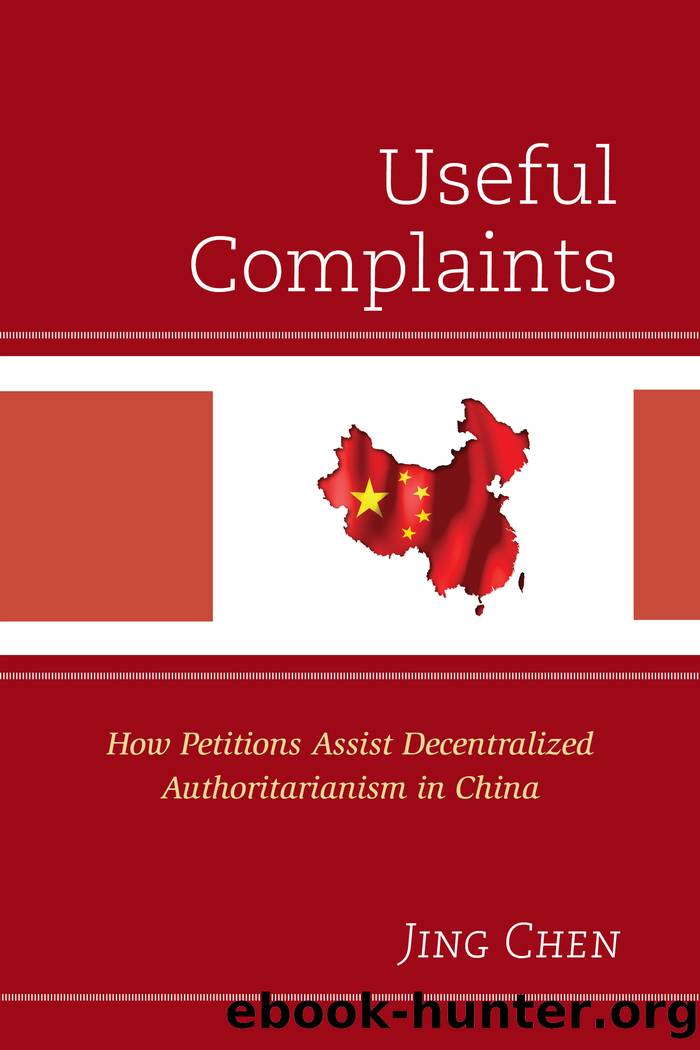Useful Complaints by Chen Jing;

Author:Chen, Jing;
Language: eng
Format: epub
Tags: undefined
Publisher: Lexington Books/Fortress Academic
Published: 2012-08-15T00:00:00+00:00
Our primary explanatory variable is a countyâs level of development. Three hypotheses follow. The first hypothesis (H1) is that counties with a higher GDP per capita (a measurement for the level of development) send more petitions to Beijing than counties with a lower GDP per capita. Citizens in richer counties may be empowered politically as a result of their economic security. It is also possible that citizensâ interests are violated more during the process of development in the more prosperous areas. Another alternative causal link is that citizens in more developed counties know that the government has more resources to handle their complaints.[25] Petitioning Beijing is one strategy that petitioners use to pressure local governments to redistribute wealth. If this hypothesis is correct, then we will see that counties with a higher GDP per capita send more petitions to Beijing.
The second hypothesis (H2) is that counties with a higher GDP per capita are associated with lower petition rates than counties with a lower GDP per capita. This could possibly be attributed to the fact that local governments with a higher GDP per capita have more resources at their disposal to solve their problems locally and therefore reduce the number of petitions sent to Beijing. The logic is similar to that of authoritarian bargain literature. The pursuit of economic gains compromises the peopleâs pursuit of their political rights.[26] This author frequently heard government officials complain during their interviews about how they were often compelled to pay petitioners to stop them from petitioning repeatedly or petitioning to higher level governments.[27] In his talk at Huangzhong University of Science and Technology in Wuhan, Hubei, Dr. Yu Jianrong, a scholar of the Chinese Academy of Social Sciences, also quoted an official who said that petitions are âthe peopleâs internal conflictsâ (Renmin Neibu Maodun 人æ°å é¨çç¾). This official further explained what the phrase, âthe peopleâs internal conflicts,â means in the context of petitioningânamely, that âthe peopleâs internal conflictsâ are conflicts that can be solved with renminbi (人æ°å¸), âthe peopleâs currency,â that is, bribes.[28]
The second hypothesis is also consistent with the findings of Bernstein and Lü, who argue that rural areas with TVEs used revenue from TVEs to partially replace the agricultural tax burden and therefore had less peasant complaints and disturbances.[29] A similar line of argument points out that regions with a low level of development are likely to feel greater pressure to develop quickly; this may compel them to adopt more ruthless measures and act in a more predatory fashion. This kind of behavior, of course, would cause more petitions to be sent to Beijing.
The null hypothesis (H0) is that there is no relationship whatsoever between a countyâs level of development and the number of petitions that a county sends to Beijing. This would mean that other factors aside from the level of development must be playing a greater role in the frequency of petitioning Beijing at the county level.
In order to test our hypotheses, our analysis also includes two control variables, the size of
Download
This site does not store any files on its server. We only index and link to content provided by other sites. Please contact the content providers to delete copyright contents if any and email us, we'll remove relevant links or contents immediately.
The Secret History by Donna Tartt(19086)
The Social Justice Warrior Handbook by Lisa De Pasquale(12190)
Thirteen Reasons Why by Jay Asher(8909)
This Is How You Lose Her by Junot Diaz(6886)
Weapons of Math Destruction by Cathy O'Neil(6279)
Zero to One by Peter Thiel(5801)
Beartown by Fredrik Backman(5754)
The Myth of the Strong Leader by Archie Brown(5507)
The Fire Next Time by James Baldwin(5442)
How Democracies Die by Steven Levitsky & Daniel Ziblatt(5218)
Promise Me, Dad by Joe Biden(5153)
Stone's Rules by Roger Stone(5087)
A Higher Loyalty: Truth, Lies, and Leadership by James Comey(4962)
100 Deadly Skills by Clint Emerson(4925)
Rise and Kill First by Ronen Bergman(4788)
Secrecy World by Jake Bernstein(4753)
The David Icke Guide to the Global Conspiracy (and how to end it) by David Icke(4717)
The Farm by Tom Rob Smith(4507)
The Doomsday Machine by Daniel Ellsberg(4490)
